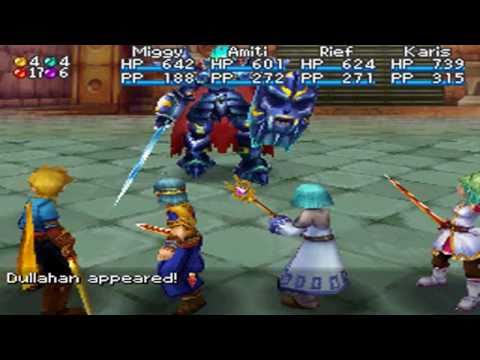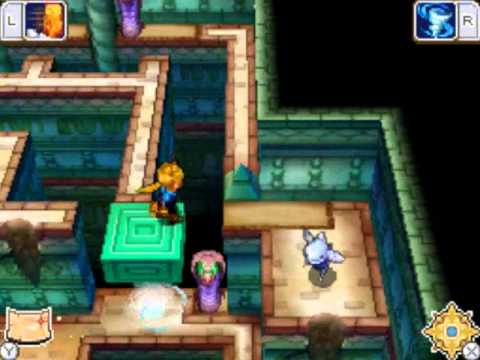Search
[{{{type}}}] {{{reason}}}
{{/data.error.root_cause}}{{{_source.title}}} {{#_source.showPrice}} {{{_source.displayPrice}}} {{/_source.showPrice}}
{{#_source.showLink}} {{/_source.showLink}} {{#_source.showDate}}{{{_source.displayDate}}}
{{/_source.showDate}}{{{_source.description}}}
{{#_source.additionalInfo}}{{#_source.additionalFields}} {{#title}} {{{label}}}: {{{title}}} {{/title}} {{/_source.additionalFields}}
{{/_source.additionalInfo}}- Details
- Category: DS
- By Aaron Schlegel
- Hits: 4932
Golden Sun: Dark Dawn (DS)

Golden Sun: Dark Dawn
Developed by Camelot Software Planning
Published by Nintendo
Released November 2010
Available for the Nintendo DS
Genre: RPG
ESRB Rating E10+ for fantasy violence.
Number of players: 1
Price: $14.99
(Amazon Affiliate Link)
Dark Dawn was the 2010 follow-up to the well beloved duo of Gameboy Advance games Golden Sun and Golden Sun: The Lost Age. Dark Dawn had a lot to live up to, as both of the previous games had in 2006 placed in IGN’s Readers Choice Top 100 games ever. With their solid reputation looming over them, publisher Camelot Software Planning again reprised their tale of psynergy-wielding adepts who need to save the world from the threat of alchemy once again.
Set 30 years after the GBA games, Dark Dawn sees you following the adventures of the original heroes’ children. Crucial to these adventures is the understanding of alchemy, which is both a force of creation and destruction in the world of Weyard. The player’s understanding of alchemy can be confusing at first, as its history and importance is something that comes in bits and pieces through dialogue with the GBA-era characters, but it is nicely expanded upon in the Sun Saga books that you can get throughout the game.
The Sun Saga books basically tell you the story of the GBA games in expedited and stylized fashion, so you can have a better understanding of alchemy and how important it is to the world of Weyard. The really nice thing about the books is that it covers what happened in the GBA games well enough so that even if you haven’t played the original GBA games (which by the way, I hadn’t) you still have a firm understanding of where Dark Dawn fits into the greater narrative of the Golden Sun series. Fortunately, Dark Dawn stands firmly enough upon its own two legs that you can enjoy the narrative of the game without having played the first two entries.
This does bring me to a point of contention, however, as knowing the history of the Golden Sun series doesn’t necessarily play into the overall narrative of Dark Dawn. The adventure starts out with a slightly innocuous fetch mission: you have to get a Roc feather to fix a glider that the brash Tyrell (one of the protagonists) broke. The adventure then evolves into something much larger as Tyrell and the other “Children of the Vale” (as they are soon to be known as) leave their home.
It is during the first few hours of gameplay that the player gets familiar with all of the game’s systems. If you have ever played a Japanese Role-Playing Game (JRPG), you know exactly what the battle system is like: random battles with monsters, turn based attacking, limit break-esque attacks; but Dark Dawn does have a few tweaks that keeps the formula interesting. First is the elemental magic system referred to as “psynergy."

Strong Points: Varied gameplay; Emphasis on friendship and sacrifice
Weak Points: Unresolved plot point; Grind-fest to defeat final boss
Moral Warnings: Classical elements based “magic” system; some skeletons and spirit monsters
Psynergy is never referred to as magic, but that is basically what it is. It is based upon the classical elements but it is given a unique spin by being called Venus (earth and plants), Mars (fire and heat), Jupiter (wind and electricity), and Mercury (water and ice). Only a select few, known as “adepts", can wield this power; it just so happens that Tyrell, Matthew, Karis, and all of your other party members happen to be adepts, so that is nice and convenient. Also expanding upon psynergy are the Djinn, cute little creatures that can help you in battle with buffs/debuffs and attacks. Get enough Djinn ready to use during a battle and you can summon creatures named/based upon ancient mythologies to put the beat-down on your enemies.
Dark Dawn does enough in the battle department to keep things interesting, but where the game truly grabs your attention is the puzzles. Now I haven’t played a ton of JRPGs, but they have not incorporated puzzles into their games to the crucial extent that Dark Dawn does. And I do mean crucial, as in, you won’t progress through the game without solving puzzles. You have to use psynergy to solve these puzzles and unlock areas, so it makes psynergy powers important beyond just being useful in battle. These puzzles are a welcome addition to the potential random battle after random battle that JRPGs can devolve into. Most of the puzzles are rather simplistic, and only one gave me trouble. Once you include the distance and height limitations of using psynergy to solve puzzles, you can see how someone could easily be annoyed by the whole thing; for myself, however, I found it to be a nice break from battling random monsters.
All in all the game is pretty fun. It is fairly easy to jump into as this title was made for anyone from children on up. There is a nice and steady climb in difficulty, but unfortunately there is also a massive end boss difficulty spike. I didn’t have to grind for experience at any time during the game except to beat the final boss, so that completely broke the flow of my experience. The spike was so ridiculous that I had to grind for six hours until I could beat the boss. I realize that I may have not pushed all of the battling systems to the limit like the game wants me to. But if I’m able to get through the entire rest of the game without having to grind for one second, what sense does it make to have a final boss be so powerful that all of the momentum of the story has to stop just so I can have a chance to beat it? Not the best way to make a game.
Regardless of my experience with the final boss, Dark Dawn is a well-written story that twists tropes well enough to deliver a unique and fun game. There is no dialogue as everyone speaks in speech bubbles (or in Matthew’s case, smiles or frowns), but the writing makes every character you come across seem distinct and personable, even if some of the later characters are given very little chance to develop. Dark Dawn is a bright and colorful game with varied environments that are done quite well but even for the DS, the 3D models of characters are pretty bad. The models are a little better during battle mode, so at least it shows that Camelot tried.
The soundtrack, while not the best I’ve ever heard in a video game, sets the tone of the varying regions very well and brings the world to life. More than anything else in the game, it is the music that creates the distinctions of the world of Weyard and gives it the appropriate feel to a quest to save all of known existence. The sound effects mostly enhance the battles and bring a heft to them worthy of any of the greats.

Higher is better
(10/10 is perfect)
Game Score - 82%
Gameplay - 15/20
Graphics - 7/10
Sound - 9/10
Stability - 5/5
Controls - 4/5
Morality Score - 86%
Violence - 7/10
Language - 8/10
Sexual Content - 3.5/10
Occult/Supernatural - 8.5/10
Cultural/Moral/Ethical - 8.5/10
Bonus: +3 for the game displays the consequences of evil, +3 story delivers good moral lesson.
I didn’t come across any stability issues, as is the case with most DS games. The controls are very easy to learn but the battle menus can become a little lengthy and cumbersome once you start accruing items and learning more psynergy moves.
Morally-wise, there isn’t a whole bunch to object to in this game. While there is the familiar select and action violence of a turn-based RPG, there is no blood or gore. There may have been some unique euphemisms the game used, but I don’t recall anything in particular. There are times when the heroes are at odds with authority figures, but this is because said authority figures are afraid to do the right thing. There is also some very slight prejudices shown, mainly in the form of different people groups not trusting each other, but it never gets anywhere beyond a “we just don’t like those people” explanation or extrapolation. There are also some enemies towards the end of the game that some would not like as you find yourself fighting skeletons and shadows.
Probably the biggest issue for most people would be the psynergy system that is based upon the classical elements. The game never goes any deeper into why some people are adepts and most are not, so any similarities to real-world pagan beliefs end there. Only one character mentions “gods” in the world of Weyard, and there seems to be a certain amount of sun and moon revering, which is interesting because a “creator god” is also mentioned by a few characters but never shown. While the mythological creatures you summon to help you in battle do have names from ancient gods and goddesses, they share little resemblance to any of their real-world portrayals (e.g. one is the rocket-launching mummy, Ramses, bursting out of a pyramid); still it is worth mentioning.
Like a lot of role-playing games, Dark Dawn is a single-player game with extremely little replay value; some would consider this a minus, though I would not. I was very slightly disappointed with the ending as it revealed an unresolved plot line that was primed for the next game (which at the time of this writing, still does not exist). For those concerned with the handful of moral flaws in the game, I will tell you that Dark Dawn’s protagonists exude the importance of friendship and trust. Dark Dawn also takes the time to touch upon the consequences of pride, as it is this pride that brings about the dark calamity to Weyard that our heroes have to fix.
Evil is shown to have a great cost as many flee for their lives and even one town is intentionally burned to keep the forces of darkness away. Much of the world becomes dark and cold as our heroes race to save it, and it is only by their heroic sacrifices (and the sacrifices of a few non-playable characters) that the world is able to be made right again. Sacrifice and friendship carry the day and it is these two themes that subtly weave their way throughout Dark Dawn. If Camelot Software Planning ever intends to continue the series, my sincere hope is that these two themes are made ever more prevalent; for when Dark Dawn focuses upon friendship and sacrifice is when the game glows most brightly.
Written by: OutcastWriter, Aaron A. Schlegel




